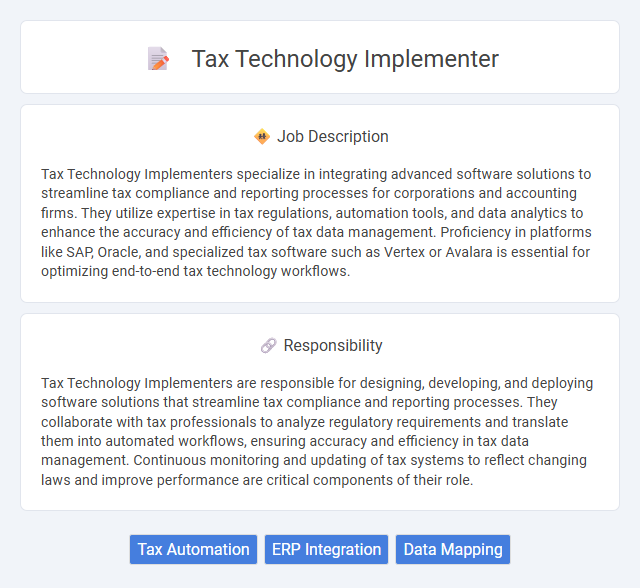
Tax Technology Implementers specialize in integrating advanced software solutions to streamline tax compliance and reporting processes for corporations and accounting firms. They utilize expertise in tax regulations, automation tools, and data analytics to enhance the accuracy and efficiency of tax data management. Proficiency in platforms like SAP, Oracle, and specialized tax software such as Vertex or Avalara is essential for optimizing end-to-end tax technology workflows.
Individuals with strong analytical skills and a background in both tax regulations and technology are likely well-suited for a Tax Technology Implementer role. Those comfortable with problem-solving and adapting to evolving software systems might find this position aligns with their strengths. People who prefer routine tasks without frequent system updates or cross-functional collaboration may face challenges in this job.
Qualification
A Tax Technology Implementer must possess strong expertise in tax software platforms such as SAP, Oracle Tax, or Vertex, along with proficiency in programming languages like SQL, Python, and Java. Candidates should hold a degree in finance, accounting, information technology, or a related field, combined with relevant certifications such as CPA, CMA, or ITIL. Experience in tax compliance processes, data integration, automation tools, and project management methodologies is essential for successful implementation and optimization of tax technology solutions.
Responsibility
Tax Technology Implementers are responsible for designing, developing, and deploying software solutions that streamline tax compliance and reporting processes. They collaborate with tax professionals to analyze regulatory requirements and translate them into automated workflows, ensuring accuracy and efficiency in tax data management. Continuous monitoring and updating of tax systems to reflect changing laws and improve performance are critical components of their role.
Benefit
Tax Technology Implementers likely enhance accuracy and efficiency in tax processes through automation and advanced software solutions. This role probably reduces the risk of compliance errors and penalties by ensuring up-to-date application of tax regulations. Companies employing Tax Technology Implementers may experience significant cost savings and improved decision-making capabilities related to tax management.
Challenge
The Tax Technology Implementer role likely involves navigating complex software integration challenges and adapting to frequent regulatory changes, which can complicate project timelines. Balancing technical demands with evolving tax compliance requirements may require constant problem-solving and agility. This position probably demands strong collaboration skills to ensure seamless communication between tax experts and IT teams.
Career Advancement
Tax Technology Implementers enhance tax compliance and reporting processes through advanced software and automation tools, driving efficiency in corporate tax departments. Mastery of tax data analytics, ERP systems, and AI integration opens opportunities for leadership roles such as Tax Technology Manager or Digital Tax Transformation Lead. Continuous skill development in emerging tax technologies and regulatory changes accelerates career growth in the evolving tax technology landscape.
Key Terms
Tax Automation
Tax Technology Implementers specialize in designing and deploying tax automation solutions that streamline compliance processes and reduce manual errors. They leverage advanced software tools like robotic process automation (RPA) and artificial intelligence (AI) to optimize tax data management and reporting accuracy. Expertise in integrating ERP systems with tax automation platforms ensures seamless tax workflow efficiency and regulatory adherence.
ERP Integration
Tax Technology Implementers specialize in integrating advanced tax software solutions with ERP systems such as SAP, Oracle, and Microsoft Dynamics to automate tax compliance and reporting processes. They leverage APIs, data mapping, and workflow customization to ensure seamless data flow between financial modules and tax engines, reducing manual errors and improving accuracy. Expertise in ERP integration enables organizations to streamline tax calculations, filing, and audit readiness within their existing enterprise infrastructure.
Data Mapping
Tax Technology Implementers specialize in designing and deploying systems that streamline tax data processing by accurately mapping financial data from multiple sources to tax compliance platforms. Their expertise in data mapping ensures the integrity and consistency of tax reports, reducing errors and enhancing audit readiness. Proficiency in tools such as Alteryx, SQL, and advanced Excel is essential for creating efficient data workflows and automating tax data transformation.
 kuljobs.com
kuljobs.com